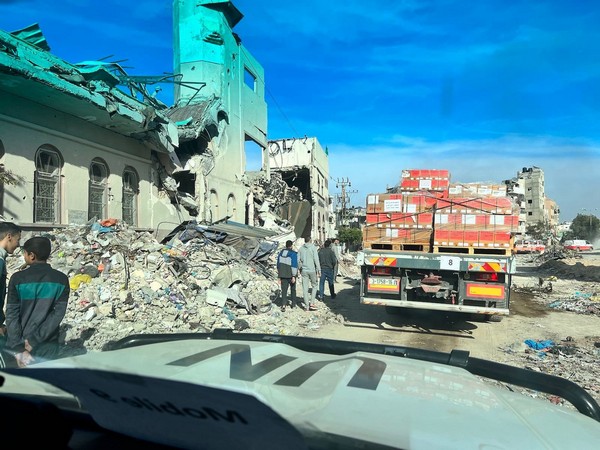
Israel ramps up strikes on Rafah ahead of potential invasion
Apr 26, 2024
Jerusalem [Israel], April 26: Israel stepped up airstrikes on Rafah overnight after saying it would evacuate civilians from the southern Gazan city and launch an all-out assault despite allies' warnings this could cause mass casualties.
Medics in the besieged Palestinian enclave reported five Israeli airstrikes on Rafah early on Thursday that hit at least three houses, killing at least six people including a local journalist.
The Gaza Strip is about 40 km (25 miles) long and between about 5 km (3 miles) and 12 km (7.5 miles) wide and is one of the most densely populated areas in the world.
In the seventh month of a devastating air and ground war, Israeli forces also resumed bombarding northern and central areas of the enclave, as well as east of Khan Younis in the south. Israel's stated goal is to destroy Hamas, though it is unclear how they would do so.
A United Nations team visiting a site for a staging area and pier for maritime aid operations was forced to take cover in a bunker on Wednesday after the area came under attack, a spokesperson said on Thursday.
They were there for "some time," but there were no injuries.
Israeli Prime Minister Benjamin Netanyahu's war cabinet was meeting "to discuss how to destroy the last vestiges, the last quarter of Hamas' battalions, in Rafah and elsewhere," government spokesperson David Mencer said.
He declined to say when or whether the classified forum might give a green light for a ground operation in Rafah.
Israel has killed at least 34,305 Palestinians, Gaza health authorities said on Thursday. The offensive has laid to waste much of the widely urbanised enclave, displacing most of its 2.3 million people and leaving many with little food, water or medical care.
A U.N. expert speaking after visits to Jordan and Egypt said aid agencies were seeing an increasing number of patients suffering from the acute lack of food in the enclave.
Israel is retaliating against an Oct. 7 Hamas attack that killed 1,200 people and led to 253 taken hostage, according to Israeli tallies. Iranian-backed Hamas is sworn to Israel's destruction due to its occupation of Palestinian territories.
Escalating Israeli warnings about invading Rafah, the last refuge for around a million civilians who fled Israeli forces further north earlier in the war, have nudged some families to leave for the nearby al-Mawasi coastal area or try to make their way to points further north, residents and witnesses said.
But many were confused over where they should go, saying their experience over the past 200 days of war had taught them that no place was genuinely safe.
Mohammad Nasser, 34, a father-of-three, said he had left Rafah two weeks ago and now lived in a shelter in Deir Al-Balah in central Gaza to avoid being caught by surprise by an Israeli invasion and unable to escape.
Shaina Low, a spokesperson for the Norwegian Refugee Council said there appeared to be fewer people in Rafah, which borders Egypt. She said teams on the ground had said people expect an invasion after the Jewish Passover holiday ends on April 30.
A senior Israeli defence official said on Wednesday Israel was poised to evacuate civilians before its attack on Rafah and had bought 40,000 tents that could house 10 to 12 people each.
Satellite images of Mawasi between Rafah, Khan Younis and the sea, an area of sand beaches and fields and stretching only around 5 by 3 km (three by two miles), showed significant camp settlements erected over the past two weeks.
Source: Fijian Broadcasting Corporation


![Dr. Raghupati Singhania, CMD, JK Tyre & Industries and jury members presented Indian Car of the Year [ICOTY] 2025 award to Mahindra & Mahindra team](https://worldnewsn.s3.amazonaws.com/media/images/ANI-20250111122719.jpg)






